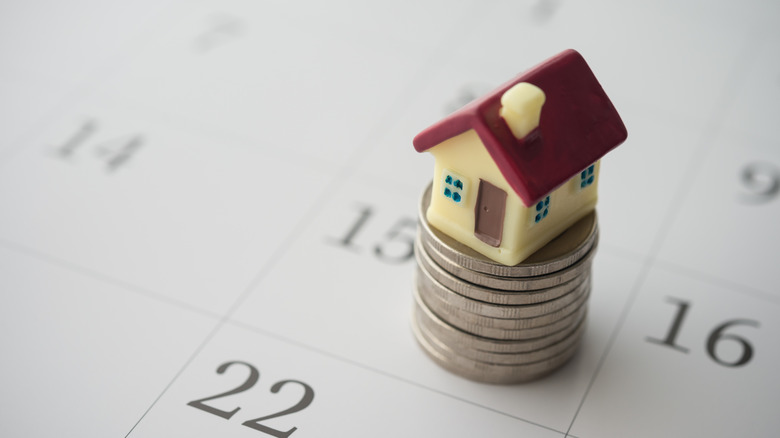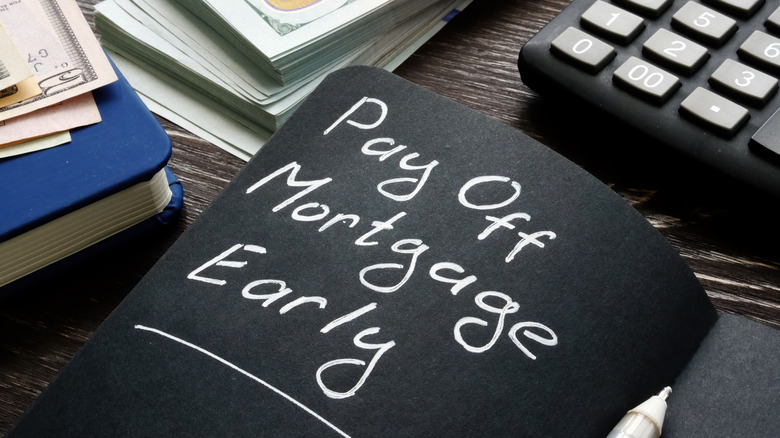The Ideal Age To Pay Off Your Mortgage Might Not Be As Low As You Think
Paying off your mortgage can be both a massive accomplishment and a huge relief all at once. Whether you've been paying for 30 years, or only a few, knowing your home is officially yours can be a significant milestone. According to U.S. Census Bureau data, from 2018 to 2023, an average of 61.2% of homeowners had a mortgage. Even more complicated is that, during that same period, almost 11% of all properties with mortgages had multiple mortgages and/or home equity loans. While many might believe the best strategy for paying off their mortgage is to pay it off as soon as possible, there could be some other financial implications to consider before going ahead with that strategy.
Depending on a host of financial factors from what kind of mortgage you have to interest rates to your household income to any potential investment options, it isn't necessarily a bad thing to wait to pay off your mortgage in its entirety. This is especially true if that money can better serve you somewhere else. Money Digest spoke with Aaron Cirksena, Founder & CEO of MDRN Capital, about the ideal age to pay off a mortgage, and what timeline consumers should stick to when it comes to finally paying it off. While you might think the sooner the better when it comes to paying off your mortgage, the reality for when it best serves you to be mortgage-free could be a little later than you might think.
The ideal age to pay off a mortgage
Aaron Cirksena told us the ideal time for paying off your mortgage, "Ideally, mid-60s, around retirement age." As for why paying off your mortgage by the time you hit retirement is ideal, Cirksena first emphasized just how valuable retiring without debt can be before also explaining that, "it can get rid of perhaps your biggest monthly expense." According to the Bureau of Labor Statistics, in 2023 housing was the largest spending category for U.S. households, accounting for 32.9% of total annual household expenditures. Cirksena went on to say, "This is something to consider when you have a fixed income. People also find peace knowing their home is fully theirs." However, Cirksena noted, "If you can pay it off earlier and redirect those funds toward other investments, that's great." Ultimately, your individual finances are the key to determining when the best time to pay off your mortgage might be.
With this in mind, there is an increasing housing industry issue stemming from retirees not selling their larger homes for younger families with children. Due in large part to the increased financial burden of downsizing to smaller properties (thanks to particularly high interest rates), many baby boomers are instead choosing to stay put in their homes, placing an even larger burden on the already strained housing market. Despite the fact that many baby boomers may be unable to afford to live in several states in the next decade, many are unable or unwilling to move somewhere else during retirement.
The best timeline for paying your mortgage off
It's important to remember that there is no one size fits all schedule for paying off a mortgage. Aaron Cirksena went on to tell us that the exact timeline for paying off your mortgage really comes down to the individual priorities in your particular household. He explained, "It really depends on what matters most to you. If you're looking at a low-interest mortgage and have the opportunity to grow your retirement accounts or investments, sticking to the loan's terms might work for some. If being debt-free is your top priority, paying it off early is worth it then." Considering your retirement savings (vs. your goals), your available cash on hand, current mortgage interest rate, and even your own peace of mind can and should all be significant factors when deciding on whatever your particular mortgage payment strategy ends up being.
It's also important to remember just how much your interest rate can extend how long it takes to ultimately pay off your mortgage. Even a difference of just 1% in your mortgage loan terms can have a significant impact on just how long it might take you to pay it off. If you have a 6% mortgage rate, you will probably be more inclined to pay off your mortgage faster than someone with a significantly lower interest rate. It's also particularly important to properly calculate what your monthly income should be for certain mortgage payment amounts to ensure you don't get in over your head when purchasing a new home.


